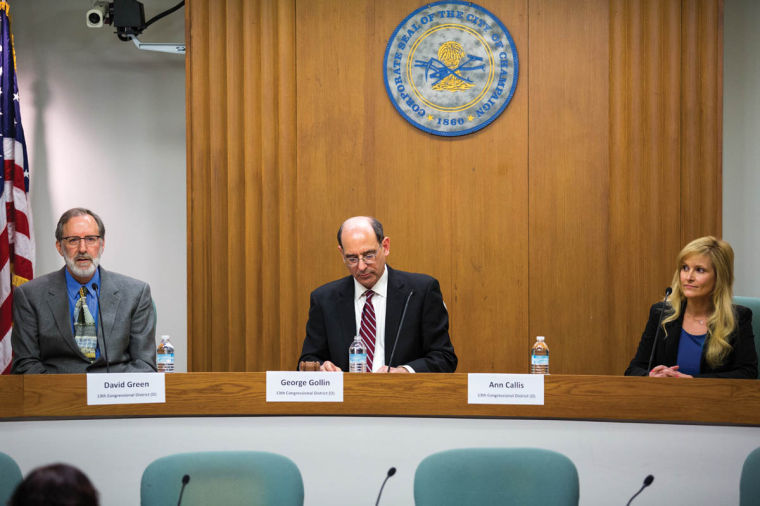Where do the Democratic candidates for the 13th congressional stand?
Feb 24, 2014
To see where the Republican candidates stand, click here.
Candidates running for the 13th congressional district met Thursday night for a public forum to discuss both national and local issues at the Champaign City Council Chambers. All candidates beside the incumbent Rep. Rodney Davis were in attendance.
The candidates for the democratic primary are David Green, who works at the University’s Institute of Government and Public Affairs; George Gollin, a physics professor at the University; and Ann Callis, a former judge from Edwardsville.
Michael Firsching, a veterinarian from Midway, and Erika Harold, an attorney from Urbana and former Miss America, are running against Rep. Davis in the Republican primary.
The primaries are scheduled for March 18.
Get The Daily Illini in your inbox!
HIGHER EDUCATION
Green: “College needs to be free like it used to be; we can well afford it. $150 billion would make public higher education at the state-level free on a nationwide basis. It’s chump change for the 1 percent to fund free higher education.”
Gollin: “I think the community college system is the key to the whole ballgame in affordability. We see discussions in Tennessee about making the system be free, we see ways of doing concurrent enrollment with high schools, we would like to also have the accrediting organizations in the federal government to pressure the schools to identify their costs.”
{{tncms-asset app=”editorial” id=”9e48ae62-9d21-11e3-8440-001a4bcf6878″}}
Callis: “It’s important that we increase and strengthen Pell grants … I also support Senator (Dick) Durbin’s Student Bill of Rights, I think that the burgeoning student loan debt and predatory student loans are going to be the next huge financial crisis with our nation.”
{{tncms-asset app=”editorial” id=”4bf357ac-9d21-11e3-8d72-001a4bcf6878″}}
IMMIGRATION
Callis: “The comprehensive immigration reform supported by Senator (Dick) Durbin must be brought to the House, and I would vote for that. It has a very measured pathway to citizenship, and I also think it strengthens our borders, and I think it would do an enormous benefit to our economy.”
Green: “I would vote for the bill that has been referred to, even though it’s inadequate in many ways. It provides too expensive, too long and too onerous a path to citizenship. It should be much easier. Immigrants in this country contribute to our economy and they need to have their rights, and their children need to grow up with the same rights as we have.”
Gollin: “I support the provisions of the senate bill. It’s a good start, it does not address all of the problems but it’s a good start on what we need to do. …We need a fast-track for certain categories of people, DREAMers – the people who are students that have come here as young children with their parents should be made able to become citizens quite rapidly. Also, we have about 65,000 immigrants who are serving in the military and we should give them citizenship rapidly.”
ENVIRONMENT
Callis: “The climate change issue is a grave, grave issue, not only for the U.S., but also for the world. … In just the past few weeks we’ve had terribly cold weather across this nation, and now people are denying that climate change exists just because it’s cold outside, denying 30-year trends, an abundance of scientific evidence. So I do believe that we have to make some changes and really be cognizant of what is going on with our environment. And protecting our groundwater and keeping our air clean for our children and our grandchildren.”
Green: “Carbon tax, good idea. Cap and trade, bad idea. We need to move toward a post-fossil fuel future with conservation, retrofitting, solar energy, wind and creating a cost-structure which encourages renewable energy resources. We need to move quickly, it’s a dire need and there’s plenty of jobs to be found — not in fracking, not in coal mining, but in conservation and moving toward a post-fossil fuel future.”
Gollin: “I agree that we need to move away from a carbon-based economy. This is actually an issue that shows why it would be helpful to have more scientific expertise in Congress. We really need to imbed questions about specific energy policies into a much larger program involving new forms of energy production, how to deal with the wastes that come about from nuclear and other things.”
MINIMUM WAGE
Callis: “It is something that we could do immediately, even incrementally. If we raise our minimum wage immediately, it will raise two to five million Americans out of poverty. That’s thousands of Illinoisans and I think it’s something that could happen immediately and would help the poverty in our area.”
Green: “The federal government needs to create living wage job for everyone who wants one … All these jobs at living wages of $15 per hour.”
Gollin: Gollin was not directly asked about his position on raising minimum wage at the debate; however, on Dec. 5, 2013, he came-out in support for the “Fight for $15” campaign at a protest in front of McDonald’s. “When you do a real full accounting of things, what you find is that to get cheaper hamburgers, cheaper goods, we’re having to put tax revenues into important programs like food stamps and other forms of aid,” he said. “You pay either right there at the counter when you buy something from a place that’s not paying its workers well, or you pay because we have to subsidize people so they don’t starve to death.”






